Unit 1 Asia Welcome to the unit课件(共32张PPT) 2023-2024学年牛津译林版英语九年级下册
文档属性
| 名称 | Unit 1 Asia Welcome to the unit课件(共32张PPT) 2023-2024学年牛津译林版英语九年级下册 | 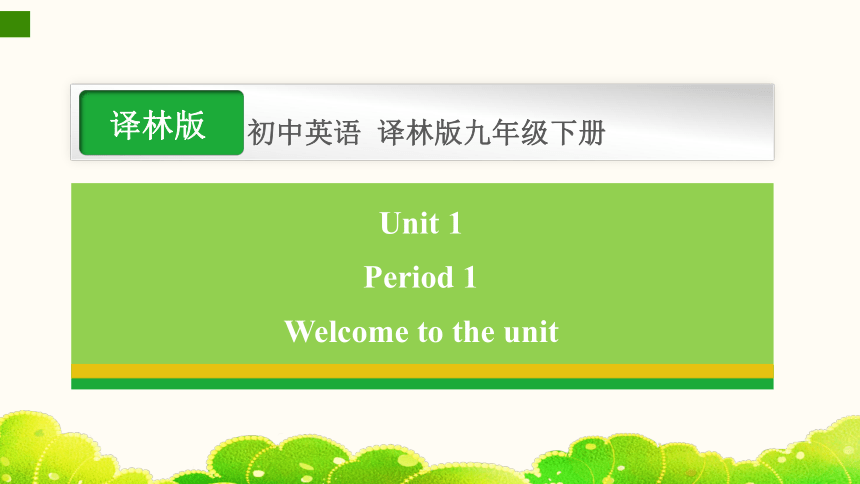 | |
| 格式 | pptx | ||
| 文件大小 | 18.8MB | ||
| 资源类型 | 教案 | ||
| 版本资源 | 牛津译林版 | ||
| 科目 | 英语 | ||
| 更新时间 | 2024-01-03 18:22:46 | ||
图片预览


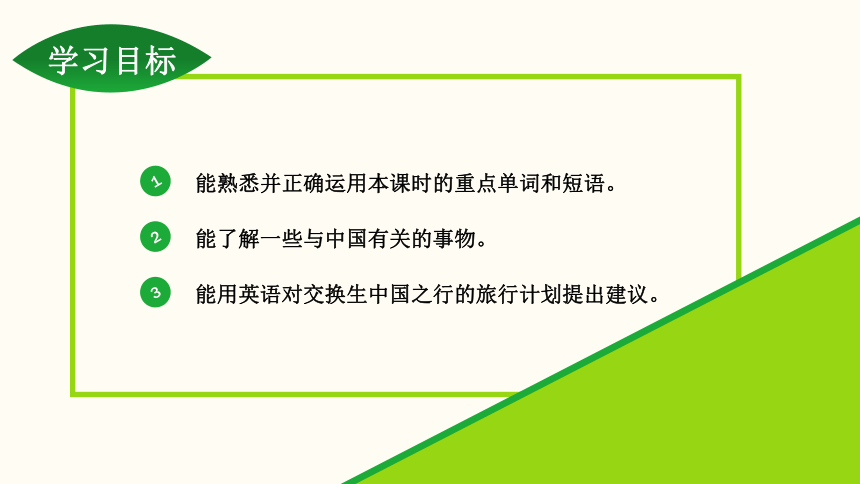
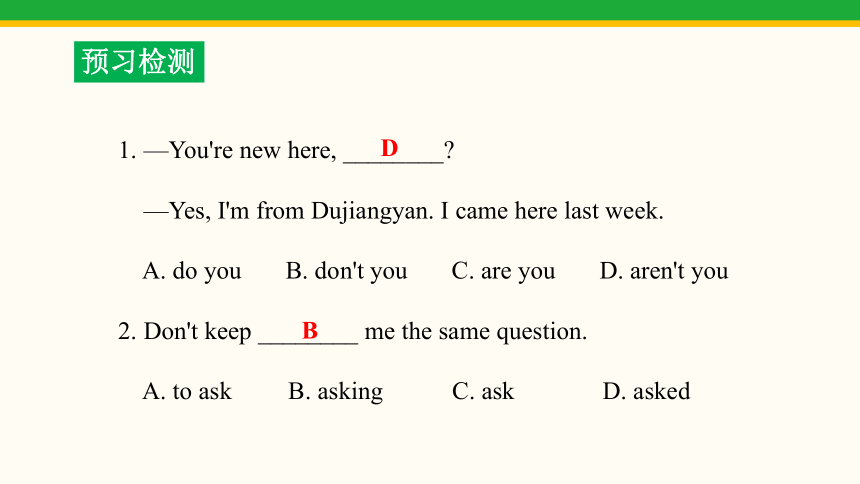
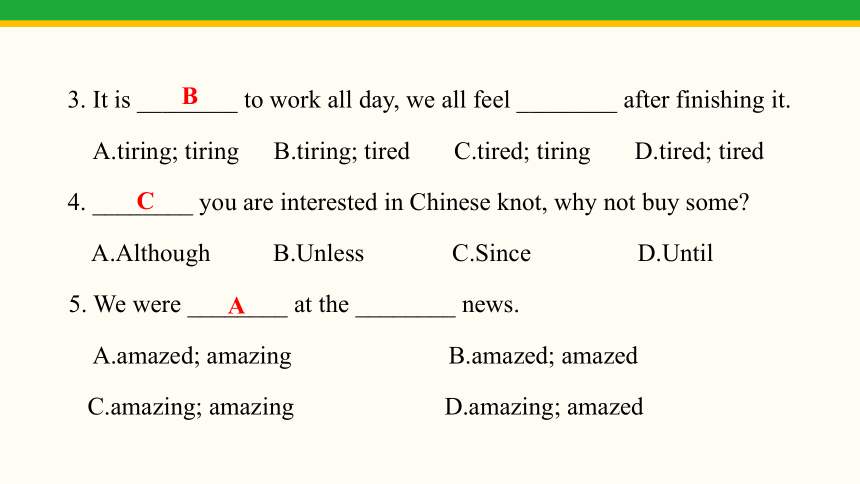
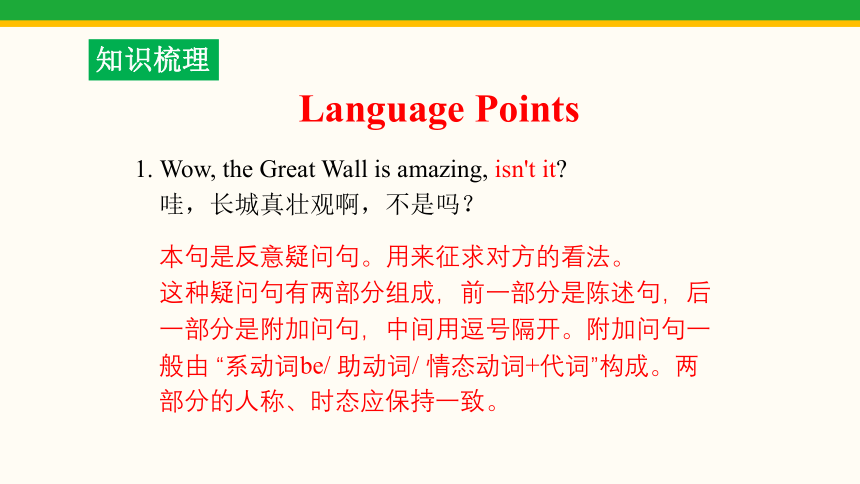
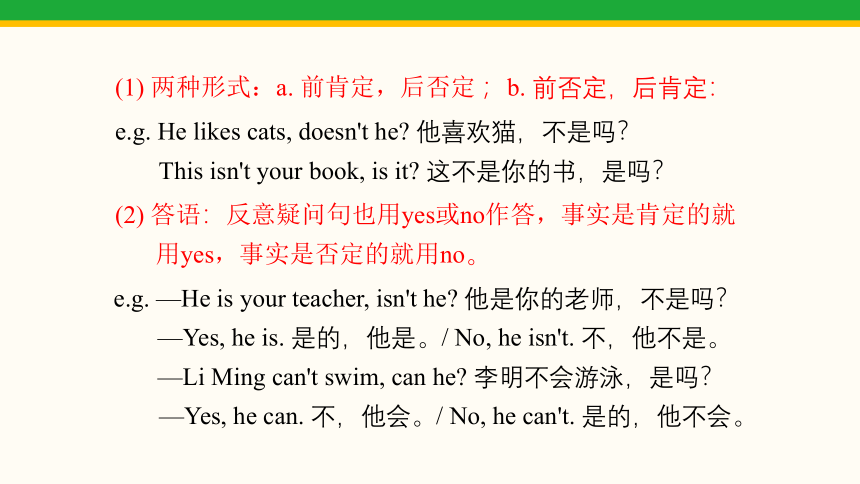
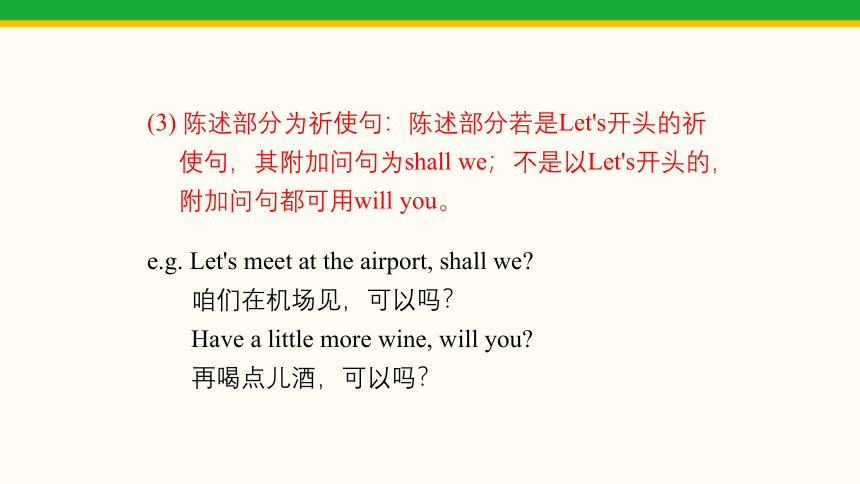
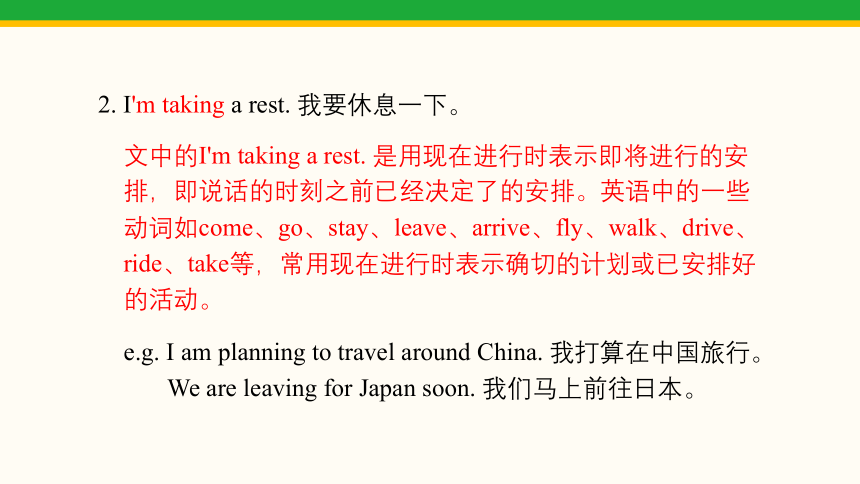
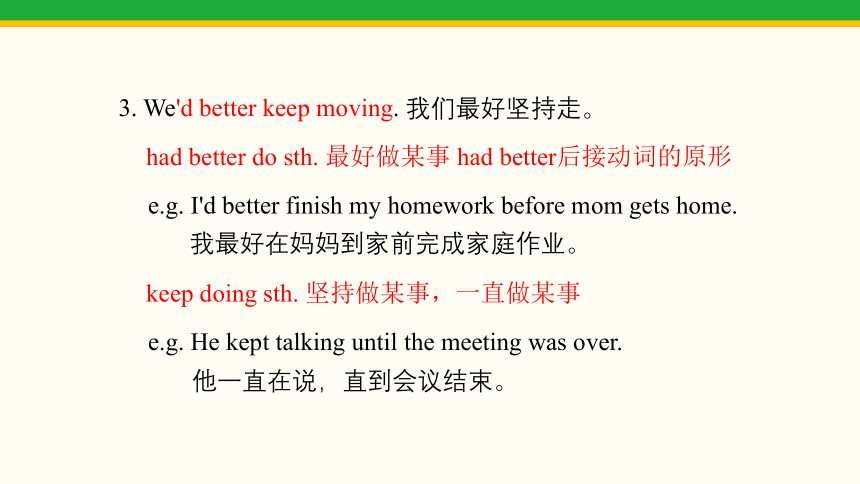
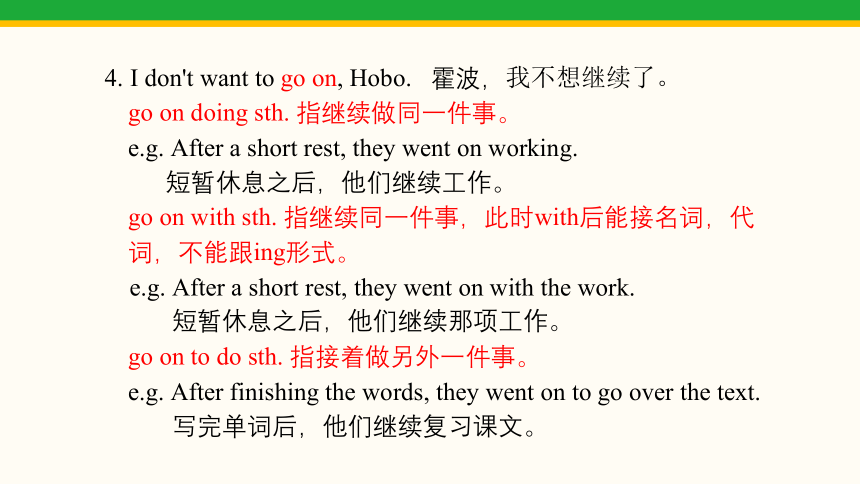
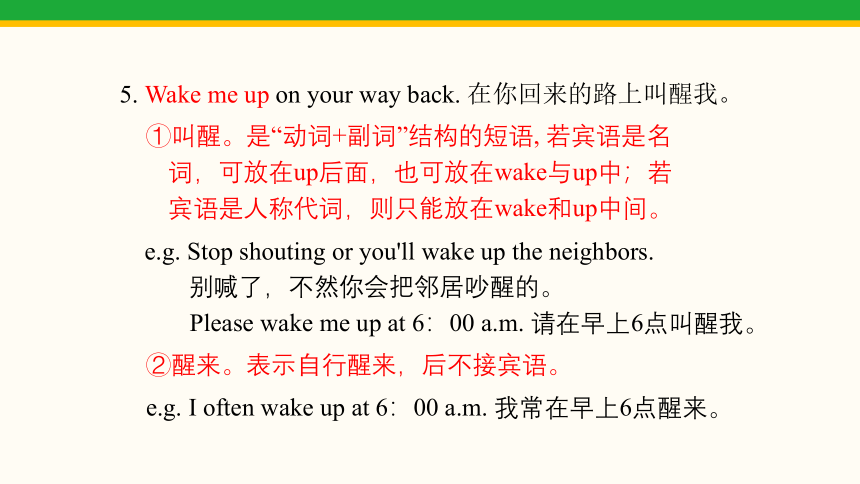
文档简介
(共32张PPT)
译林版
初中英语 译林版九年级下册
Unit 1
Period 1
Welcome to the unit
新课导入
Video about China
1
2
能熟悉并正确运用本课时的重点单词和短语。
能了解一些与中国有关的事物。
3
能用英语对交换生中国之行的旅行计划提出建议。
预习检测
1. —You're new here, ________
—Yes, I'm from Dujiangyan. I came here last week.
A. do you B. don't you C. are you D. aren't you
2. Don't keep ________ me the same question.
A. to ask B. asking C. ask D. asked
D
B
3. It is ________ to work all day, we all feel ________ after finishing it.
A.tiring; tiring B.tiring; tired C.tired; tiring D.tired; tired
4. ________ you are interested in Chinese knot, why not buy some
A.Although B.Unless C.Since D.Until
5. We were ________ at the ________ news.
A.amazed; amazing B.amazed; amazed
C.amazing; amazing D.amazing; amazed
B
C
A
知识梳理
Language Points
1. Wow, the Great Wall is amazing, isn't it
哇,长城真壮观啊,不是吗?
本句是反意疑问句。用来征求对方的看法。
这种疑问句有两部分组成,前一部分是陈述句,后一部分是附加问句,中间用逗号隔开。附加问句一般由 “系动词be/ 助动词/ 情态动词+代词”构成。两部分的人称、时态应保持一致。
e.g. He likes cats, doesn't he 他喜欢猫,不是吗?
This isn't your book, is it 这不是你的书,是吗?
(1) 两种形式:a. 前肯定,后否定 ;b. 前否定,后肯定:
e.g. —He is your teacher, isn't he 他是你的老师,不是吗?
—Yes, he is. 是的,他是。/ No, he isn't. 不,他不是。
—Li Ming can't swim, can he 李明不会游泳,是吗?
—Yes, he can. 不,他会。/ No, he can't. 是的,他不会。
(2) 答语:反意疑问句也用yes或no作答,事实是肯定的就用yes,事实是否定的就用no。
e.g. Let's meet at the airport, shall we
咱们在机场见,可以吗?
Have a little more wine, will you
再喝点儿酒,可以吗?
(3) 陈述部分为祈使句:陈述部分若是Let's开头的祈使句,其附加问句为shall we;不是以Let's开头的,附加问句都可用will you。
2. I'm taking a rest. 我要休息一下。
文中的I'm taking a rest. 是用现在进行时表示即将进行的安排,即说话的时刻之前已经决定了的安排。英语中的一些动词如come、go、stay、leave、arrive、fly、walk、drive、ride、take等,常用现在进行时表示确切的计划或已安排好的活动。
e.g. I am planning to travel around China. 我打算在中国旅行。
We are leaving for Japan soon. 我们马上前往日本。
3. We'd better keep moving. 我们最好坚持走。
had better do sth. 最好做某事 had better后接动词的原形
e.g. I'd better finish my homework before mom gets home. 我最好在妈妈到家前完成家庭作业。
keep doing sth. 坚持做某事,一直做某事
e.g. He kept talking until the meeting was over.
他一直在说,直到会议结束。
e.g. After a short rest, they went on working.
短暂休息之后,他们继续工作。
4. I don't want to go on, Hobo. 霍波,我不想继续了。
go on doing sth. 指继续做同一件事。
e.g. After a short rest, they went on with the work. 短暂休息之后,他们继续那项工作。
go on with sth. 指继续同一件事,此时with后能接名词,代词,不能跟ing形式。
e.g. After finishing the words, they went on to go over the text.
写完单词后,他们继续复习课文。
go on to do sth. 指接着做另外一件事。
e.g. Stop shouting or you'll wake up the neighbors.
别喊了,不然你会把邻居吵醒的。
Please wake me up at 6:00 a.m. 请在早上6点叫醒我。
5. Wake me up on your way back. 在你回来的路上叫醒我。
①叫醒。是“动词+副词”结构的短语, 若宾语是名词,可放在up后面,也可放在wake与up中;若宾语是人称代词,则只能放在wake和up中间。
e.g. I often wake up at 6:00 a.m. 我常在早上6点醒来。
②醒来。表示自行醒来,后不接宾语。
了解一些与中国有关的事物
Free Talk
If some foreign students want to know about China, what Chinese things will you introduce to them
Chinese things
Chinese paper-cutting 中国剪纸
dragon dance 舞龙
traditional Chinese medicine 中医药
chopsticks 筷子
calligraphy书法
Chinese knot 中国结
Chinese things
Chinese opera 中国戏曲
kung fu 功夫
silk丝绸
Chinese things
The British exchange students have arrived in Beijing. Millie is showing them some pictures of Chinese things. Help her write the correct name under each picture.
Chinese knot Chinese opera Chinese paper-cutting chopsticks dragon dance kung fu
Chinese knot Chinese opera Chinese paper-cutting chopsticks dragon dance kung fu
___________________ ___________________ ___________________
___________________ ___________________ ___________________
1 2 3
4 5 6
dragon dance
Chinese opera
chopsticks
Chinese knot
Chinese paper-cutting
kung fu
通过以
活动小结
通过以上活动,我们了解了与中国有关的事物:
中国结 _________________
筷子 _________________
中国戏曲 _________________
舞龙 _________________
中国剪纸 _________________
功夫 _________________
Chinese knot
chopsticks
Chinese opera
dragon dance
Chinese paper-cutting
kung fu
探究二
用英语对交换生中国之行的旅行计划提出建议
Free Talk
If your foreign friend asks you for suggestions on his/her travel plan in China, what will you advise him/her to see and where will you advise him/her to visit
Kevin, a British exchange student, is asking Millie for suggestions on his travel plan. Listen to the tape and answer the questions.
1. Which city does Millie suggest visiting first Why
2. What can Kevin do in this city
Beijing. Because Kevin is in Beijing now.
He can visit Tian'anmen Square, the Palace Museum and the Great Wall. He can also go and enjoy Beijing opera.
Kevin: I'm planning to travel around China. Where shall I visit first, Millie
Millie: Since you're in Beijing now, why don't you start from here Tian'anmen Square, the Palace Museum and the Great Wall are wonderful places to go.
Kevin: Good idea. What special things can I see in Beijing
Millie: Chinese opera is a kind of traditional Chinese art, and Beijing opera is one of the most popular. You can go and enjoy it.
Kevin: OK. Thank you for your suggestions.
Millie: You're welcome.
Work in pairs and act it out!
Work in pairs and give your own ideas about it. Use the conversation below as a model.
A: I'm planning to travel around China. Where shall I visit first, B
B: Since you're in ... now, why don't you start from here ..., ... and ... are wonderful places to go.
A: Good idea. What special things can I see in ...
B: ... is a kind of traditional Chinese art, and ... is one of the most popular. You can go and enjoy it.
A: OK. Thank you for your suggestions.
B: You're welcome.
Look! Hobo and Eddie are climbing the Great Wall. Let's go and see whether visiting the Great Wall is a good choice.
Wow, the Great Wall is amazing, isn't it
No, it isn't. It's tiring to climb the steps, and my feet hurt. I'm taking a rest.
No, Eddie! There's still a long way to go. We'd better keep moving.
I don't want to go on, Hobo. Wake me up on your way back.
1. What does Eddie think of climbing the Great Wall
2. What does Hobo think of the Great Wall
Answer the questions below.
He thinks it's amazing.
He thinks it's tiring to climb the steps and he doesn't want to go on.
Work in pairs and act it out!
通过以
活动小结
通过以上活动,我们学习了用英语对交换生中国之行的旅行计划提出建议:
Millie建议英国交换生Kevin从________开始他的中国之行,他可以参观_____________、___________和_____________等景点,也可以欣赏中国戏剧里面最受欢迎的戏剧之一__________。
北京
天安门广场
故宫
长城
京剧
1. Compared with the most developed countries, our country still has
_____________.
2. Running all time is very _____________, you'd better stop to have
a rest.
3. After a while, I _____________ the book.
4. The boy _____________ for the whole afternoon.
5. I _____________ early this morning.
6. Beijing Opera is the best-known form of _____________ abroad.
当堂检测
选词填空。
woke up, went on reading, Chinese opera, a long way to go, kept sleeping, tiring
a long way to go
tiring
went on reading
kept sleeping
woke up
Chinese opera
Unit 1
Period 1
与中国有关的事物:
Chinese knot _______ Chinese opera ________
Chinese paper-cutting ___________
chopsticks _________ dragon dance _________
kung fu ___________
对交换生中国之行的旅行计划提出建议:
Millie建议英国交换生Kevin从________开始他的中国之行,他可以参观__________、_______和_________等景点,也可以欣赏中国戏剧里面最受欢迎的戏剧之一________。
重点单词和短语:
tiring, step, Chinese knot, Chinese opera, Chinese paper-cutting, chopsticks, dragon dance, had better, go on
中国结
中国戏曲
中国剪纸
筷子
舞龙
功夫
北京
天安门广场
故宫
长城
京剧
译林版
初中英语 译林版九年级下册
Unit 1
Period 1
Welcome to the unit
新课导入
Video about China
1
2
能熟悉并正确运用本课时的重点单词和短语。
能了解一些与中国有关的事物。
3
能用英语对交换生中国之行的旅行计划提出建议。
预习检测
1. —You're new here, ________
—Yes, I'm from Dujiangyan. I came here last week.
A. do you B. don't you C. are you D. aren't you
2. Don't keep ________ me the same question.
A. to ask B. asking C. ask D. asked
D
B
3. It is ________ to work all day, we all feel ________ after finishing it.
A.tiring; tiring B.tiring; tired C.tired; tiring D.tired; tired
4. ________ you are interested in Chinese knot, why not buy some
A.Although B.Unless C.Since D.Until
5. We were ________ at the ________ news.
A.amazed; amazing B.amazed; amazed
C.amazing; amazing D.amazing; amazed
B
C
A
知识梳理
Language Points
1. Wow, the Great Wall is amazing, isn't it
哇,长城真壮观啊,不是吗?
本句是反意疑问句。用来征求对方的看法。
这种疑问句有两部分组成,前一部分是陈述句,后一部分是附加问句,中间用逗号隔开。附加问句一般由 “系动词be/ 助动词/ 情态动词+代词”构成。两部分的人称、时态应保持一致。
e.g. He likes cats, doesn't he 他喜欢猫,不是吗?
This isn't your book, is it 这不是你的书,是吗?
(1) 两种形式:a. 前肯定,后否定 ;b. 前否定,后肯定:
e.g. —He is your teacher, isn't he 他是你的老师,不是吗?
—Yes, he is. 是的,他是。/ No, he isn't. 不,他不是。
—Li Ming can't swim, can he 李明不会游泳,是吗?
—Yes, he can. 不,他会。/ No, he can't. 是的,他不会。
(2) 答语:反意疑问句也用yes或no作答,事实是肯定的就用yes,事实是否定的就用no。
e.g. Let's meet at the airport, shall we
咱们在机场见,可以吗?
Have a little more wine, will you
再喝点儿酒,可以吗?
(3) 陈述部分为祈使句:陈述部分若是Let's开头的祈使句,其附加问句为shall we;不是以Let's开头的,附加问句都可用will you。
2. I'm taking a rest. 我要休息一下。
文中的I'm taking a rest. 是用现在进行时表示即将进行的安排,即说话的时刻之前已经决定了的安排。英语中的一些动词如come、go、stay、leave、arrive、fly、walk、drive、ride、take等,常用现在进行时表示确切的计划或已安排好的活动。
e.g. I am planning to travel around China. 我打算在中国旅行。
We are leaving for Japan soon. 我们马上前往日本。
3. We'd better keep moving. 我们最好坚持走。
had better do sth. 最好做某事 had better后接动词的原形
e.g. I'd better finish my homework before mom gets home. 我最好在妈妈到家前完成家庭作业。
keep doing sth. 坚持做某事,一直做某事
e.g. He kept talking until the meeting was over.
他一直在说,直到会议结束。
e.g. After a short rest, they went on working.
短暂休息之后,他们继续工作。
4. I don't want to go on, Hobo. 霍波,我不想继续了。
go on doing sth. 指继续做同一件事。
e.g. After a short rest, they went on with the work. 短暂休息之后,他们继续那项工作。
go on with sth. 指继续同一件事,此时with后能接名词,代词,不能跟ing形式。
e.g. After finishing the words, they went on to go over the text.
写完单词后,他们继续复习课文。
go on to do sth. 指接着做另外一件事。
e.g. Stop shouting or you'll wake up the neighbors.
别喊了,不然你会把邻居吵醒的。
Please wake me up at 6:00 a.m. 请在早上6点叫醒我。
5. Wake me up on your way back. 在你回来的路上叫醒我。
①叫醒。是“动词+副词”结构的短语, 若宾语是名词,可放在up后面,也可放在wake与up中;若宾语是人称代词,则只能放在wake和up中间。
e.g. I often wake up at 6:00 a.m. 我常在早上6点醒来。
②醒来。表示自行醒来,后不接宾语。
了解一些与中国有关的事物
Free Talk
If some foreign students want to know about China, what Chinese things will you introduce to them
Chinese things
Chinese paper-cutting 中国剪纸
dragon dance 舞龙
traditional Chinese medicine 中医药
chopsticks 筷子
calligraphy书法
Chinese knot 中国结
Chinese things
Chinese opera 中国戏曲
kung fu 功夫
silk丝绸
Chinese things
The British exchange students have arrived in Beijing. Millie is showing them some pictures of Chinese things. Help her write the correct name under each picture.
Chinese knot Chinese opera Chinese paper-cutting chopsticks dragon dance kung fu
Chinese knot Chinese opera Chinese paper-cutting chopsticks dragon dance kung fu
___________________ ___________________ ___________________
___________________ ___________________ ___________________
1 2 3
4 5 6
dragon dance
Chinese opera
chopsticks
Chinese knot
Chinese paper-cutting
kung fu
通过以
活动小结
通过以上活动,我们了解了与中国有关的事物:
中国结 _________________
筷子 _________________
中国戏曲 _________________
舞龙 _________________
中国剪纸 _________________
功夫 _________________
Chinese knot
chopsticks
Chinese opera
dragon dance
Chinese paper-cutting
kung fu
探究二
用英语对交换生中国之行的旅行计划提出建议
Free Talk
If your foreign friend asks you for suggestions on his/her travel plan in China, what will you advise him/her to see and where will you advise him/her to visit
Kevin, a British exchange student, is asking Millie for suggestions on his travel plan. Listen to the tape and answer the questions.
1. Which city does Millie suggest visiting first Why
2. What can Kevin do in this city
Beijing. Because Kevin is in Beijing now.
He can visit Tian'anmen Square, the Palace Museum and the Great Wall. He can also go and enjoy Beijing opera.
Kevin: I'm planning to travel around China. Where shall I visit first, Millie
Millie: Since you're in Beijing now, why don't you start from here Tian'anmen Square, the Palace Museum and the Great Wall are wonderful places to go.
Kevin: Good idea. What special things can I see in Beijing
Millie: Chinese opera is a kind of traditional Chinese art, and Beijing opera is one of the most popular. You can go and enjoy it.
Kevin: OK. Thank you for your suggestions.
Millie: You're welcome.
Work in pairs and act it out!
Work in pairs and give your own ideas about it. Use the conversation below as a model.
A: I'm planning to travel around China. Where shall I visit first, B
B: Since you're in ... now, why don't you start from here ..., ... and ... are wonderful places to go.
A: Good idea. What special things can I see in ...
B: ... is a kind of traditional Chinese art, and ... is one of the most popular. You can go and enjoy it.
A: OK. Thank you for your suggestions.
B: You're welcome.
Look! Hobo and Eddie are climbing the Great Wall. Let's go and see whether visiting the Great Wall is a good choice.
Wow, the Great Wall is amazing, isn't it
No, it isn't. It's tiring to climb the steps, and my feet hurt. I'm taking a rest.
No, Eddie! There's still a long way to go. We'd better keep moving.
I don't want to go on, Hobo. Wake me up on your way back.
1. What does Eddie think of climbing the Great Wall
2. What does Hobo think of the Great Wall
Answer the questions below.
He thinks it's amazing.
He thinks it's tiring to climb the steps and he doesn't want to go on.
Work in pairs and act it out!
通过以
活动小结
通过以上活动,我们学习了用英语对交换生中国之行的旅行计划提出建议:
Millie建议英国交换生Kevin从________开始他的中国之行,他可以参观_____________、___________和_____________等景点,也可以欣赏中国戏剧里面最受欢迎的戏剧之一__________。
北京
天安门广场
故宫
长城
京剧
1. Compared with the most developed countries, our country still has
_____________.
2. Running all time is very _____________, you'd better stop to have
a rest.
3. After a while, I _____________ the book.
4. The boy _____________ for the whole afternoon.
5. I _____________ early this morning.
6. Beijing Opera is the best-known form of _____________ abroad.
当堂检测
选词填空。
woke up, went on reading, Chinese opera, a long way to go, kept sleeping, tiring
a long way to go
tiring
went on reading
kept sleeping
woke up
Chinese opera
Unit 1
Period 1
与中国有关的事物:
Chinese knot _______ Chinese opera ________
Chinese paper-cutting ___________
chopsticks _________ dragon dance _________
kung fu ___________
对交换生中国之行的旅行计划提出建议:
Millie建议英国交换生Kevin从________开始他的中国之行,他可以参观__________、_______和_________等景点,也可以欣赏中国戏剧里面最受欢迎的戏剧之一________。
重点单词和短语:
tiring, step, Chinese knot, Chinese opera, Chinese paper-cutting, chopsticks, dragon dance, had better, go on
中国结
中国戏曲
中国剪纸
筷子
舞龙
功夫
北京
天安门广场
故宫
长城
京剧
